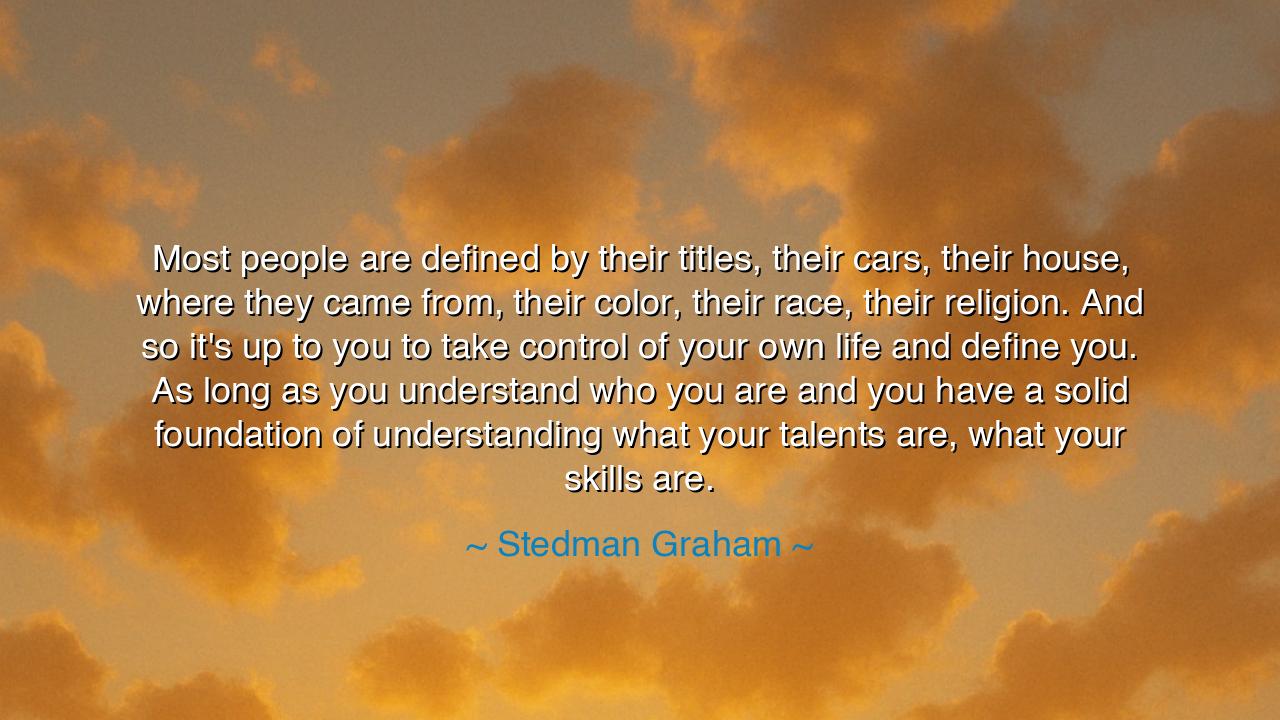
Most people are defined by their titles, their cars, their house
Most people are defined by their titles, their cars, their house, where they came from, their color, their race, their religion. And so it's up to you to take control of your own life and define you. As long as you understand who you are and you have a solid foundation of understanding what your talents are, what your skills are.






Hear, O seekers of identity and strength, the words of Stedman Graham, teacher of selfhood and guide to personal power: “Most people are defined by their titles, their cars, their house, where they came from, their color, their race, their religion. And so it's up to you to take control of your own life and define you. As long as you understand who you are and you have a solid foundation of understanding what your talents are, what your skills are.” In this declaration lies a trumpet call to freedom—the reminder that true identity is not bestowed by society’s labels nor by the shallow ornaments of wealth, but by the foundation of self-knowledge.
The origin of these words flows from Graham’s own life. Born in New Jersey, he rose through hardship and obscurity to become an educator, entrepreneur, and author. Yet he saw how the world often judged by externals—titles, possessions, appearances—measuring people by what they seemed rather than who they were. Rejecting this prison of labels, Graham built a philosophy of self-definition, teaching that dignity comes not from what others call you, but from what you know yourself to be. His life embodies the truth he proclaims: mastery of the self is greater than mastery of status.
The ancients also sang this song of selfhood. Socrates declared, “Know thyself,” for in self-knowledge lies the root of wisdom. The Stoics taught that the true man is not swayed by fortune or reputation, for he knows that virtue is his only true possession. Even in Scripture, David the shepherd boy was overlooked for his lack of stature, yet within himself he carried the courage to face Goliath. Again and again, the timeless truth resounds: identity is not in what you own, but in who you are.
History bears radiant witness. Consider Frederick Douglass, born enslaved and denied every worldly title or possession. By society’s measure, he was nothing. Yet through his relentless pursuit of learning, through the discovery of his own voice, he redefined himself as a free man, an orator, and a leader of nations. Douglass’s identity was not given by others; it was forged by his own understanding of his talents and his refusal to let the world confine him. His life illustrates Graham’s teaching: those who know themselves rise above every label.
The meaning of Graham’s words is clear: if you do not define yourself, the world will define you. And the world’s definitions are often shallow, fickle, or cruel. To be ruled by them is to live as a shadow of yourself. But to stand upon the solid ground of self-knowledge—to know your talents, your skills, your purpose—is to be unshakable. It is to build your house upon the rock, not upon shifting sands. Such identity cannot be bought or stolen; it is rooted in truth.
The lesson for us, O listeners, is urgent: do not measure yourself by externals. Do not confuse worth with wealth, or character with titles, or destiny with race or creed. The essence of who you are lies deeper than these. If you would live freely, you must turn inward, discern your gifts, and claim your true self. For only then will you live not as an echo of others’ judgments, but as the voice of your own calling.
Practical actions stand before you: Begin with reflection—write down your strengths, your passions, your values. Ask not, “What do others expect of me?” but “What is true of me?” Refuse to be enslaved by comparisons, for your path is not another’s path. Build habits that honor your gifts, and surround yourself with those who see the real you. And each day, remind yourself that the measure of your life is not in the things you hold, but in the truth you embody.
Thus, remember the teaching of Stedman Graham: “It’s up to you to take control of your own life and define you.” Let no title, no possession, no prejudice imprison your spirit. Know yourself, claim your gifts, and walk boldly upon the earth as one defined not by the fleeting judgments of men, but by the eternal truth of your being. For when you live from that foundation, you are unshakable, and your life will shine as a beacon for others still lost in the fog of borrowed identities.






AAdministratorAdministrator
Welcome, honored guests. Please leave a comment, we will respond soon